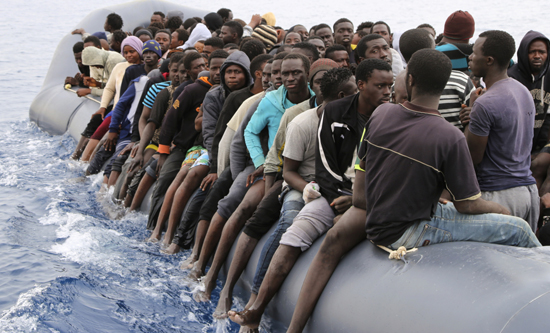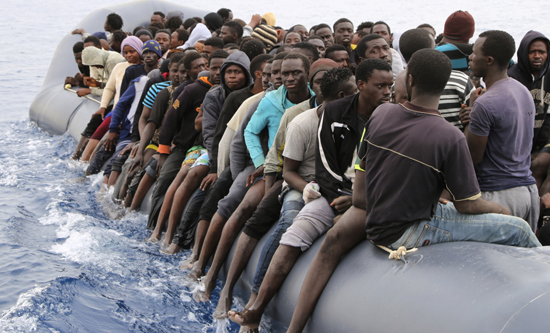
Thousands of people continue to cross the Mediterranean on unsafe, overcrowded botas.
So far this year, more than 2,150 people have been confirmed dead while trying to cross the Mediterranean to get to Europe – one in 40 of those trying to cross and three times as many as in late 2015, when EU rescue efforts began to be reduced. Meanwhile, in Britain, as the government prepares for withdrawal from the EU, restrictions and attacks on migrants continue. Tom Vickers reports.
Fortress Europe
The European Commission (EC) recently backed an Italian proposal that anybody rescuing migrants at sea should be forced to operate under the authority of the Italian and Libyan coastguards, who NGOs have said are deliberately allowing people to drown or are returning them to the violence and abuse of detention camps in Libya. The International Organisation for Migration and the UNHCR have criticised the proposed restrictions on NGOs, reflecting splits in the ruling classes. The head of UNHCR’s Europe office, Vincent Cochetel, suggested regulations would be more appropriate for NATO and commercial ships operating in the Mediterranean, which he said have been switching off their GPS systems in order to avoid having to rescue people. Far-right groups have raised tens of thousands of pounds for a plan to intercept NGO boats and prevent them rescuing people from the sea; on 24 July ‘Defend Europe’ announced its first ship had entered the Mediterranean.
Thousands of people continue to cross the Mediterranean, driven by war, poverty and state repression. Tighter controls on well-used routes have pushed many into taking more dangerous voyages. Following the building of walls, fences and other apparatus to prevent migrants entering the EU by land through the Balkans, the ‘Central Mediterranean Route’ from Libya to Italy has shifted back to centre stage. 20% more people made the crossing in the first half of 2017, compared to the same period last year; although the overall number of people entering the EU has decreased. Watch the Med, an organisation that helps coordinate emergency rescue for those whose boats get into trouble making the crossing, reports that in just three days at the end of June more than 10,000 people were rescued, mostly by NGOs who are now facing accusations that they are encouraging people smuggling.
Refugees and migrants are also trapped by borders within the EU. Tens of thousands of people are currently stranded in Greece, most in awful living conditions. They are prevented from moving on to another EU country. At the end of June the British government withdrew funding for mobile outreach teams on the island of Chios, where 4,000 refugees live in two camps, amid reports of police beatings, attacks by the far right and refugees being made to sleep in flimsy tents on pebble beaches.
Following the destruction of camps built by migrants and refugees near Calais last October, which was just the latest in a long series of demolitions, at the start of July police launched an operation to remove around a thousand people who had been sleeping rough in the Porte de la Chapelle area of Paris, near a new aid centre that was opened in November. This was the 34th police operation to remove refugees and migrants sleeping rough in Paris since 2015. The last was only two months ago, when over 1,600 people were removed. Several hundred refugees and migrants are still camped near Calais, where the French human rights ombudsman recently warned of dire conditions. Charities say the local state authorities in Calais are preventing them from distributing vital supplies.
Outsourcing border control
Imperialist states in northwest Europe have come to rely on outsourcing the most repressive element of their border controls to countries in southern and eastern Europe, North and West Africa and Asia. Britain is at the forefront of this process, and in February Theresa May even proposed resettling refugees who arrive in Europe in unspecified countries in Latin America and Asia. This is a desperate attempt to isolate the imperialist countries from the worst human consequences of imperialism and protect their claims to liberal civilisation by getting others to do their dirty work.
Turkey is accepting refugees and migrants deported from Greece in exchange for billions of euros from the EU and visa liberalisation for Turkish nationals. Poverty and exploitation are widespread for refugees in Turkey, and UN aid is reaching only 10% of the 2.5 million Syrian refugees in the country. EU cooperation with Libyan coastguards has led to the destruction of wooden boats, and their replacement with even more dangerous rubber dinghies. There are reports of corruption among Libyan coastguards, suggesting they are confiscating boats only to sell them on to other smugglers, and that they are returning migrants to detention centres where they are held indefinitely and there are widespread reports of torture. Some migrants’ families have been sent videos by gangs holding them prisoner, demanding thousands of dollars in ransoms. At the start of July Britain’s Upper Tribunal ruled that it is currently unsafe to return anybody to Libya, meaning an improvement in protection for those who have reached Britain, but with no direct impact on British support for action in the Mediterranean which leads to the same outcome.
At the start of July the EC launched a new action plan, including a call for member states to accept a more equal share of refugees and migrants arriving in southern European states, despite the ineffectiveness of its previous plan to the same effect. Only 7,000 have been resettled so far across the whole of the EU and in June the EC launched legal action against Poland, Hungary and the Czech Republic over their continued refusal to cooperate.
The new plan also included:
- €46m additional funding for Libyan authorities to police migration;
- the creation of a new Maritime Rescue and Coordination Centre in Libya;
- EU involvement in policing Libya’s southern border, adding to the military operation already underway along its coast;
- collaboration with the governments of Niger and Mali in preventing migrants suspected of heading for Europe from reaching Libya;
- new ‘readmission agreements’ whereby the governments of countries migrants have left agree to help facilitate their deportation;
- additional detention centres in Italy;
- further funding for the ‘EU-Africa Trust Fund established in 2015 to ‘encourage’ African states to accept deportees.
The EC made clear that it does not view Brexit as reducing Britain’s obligation to take a full share of resettlement and funding obligations for all these schemes, and complained that many member states have not fulfilled their promised financial contributions to previous plans. The Austrian government responded to the new plan by announcing it had despatched tanks and 750 soldiers to its border with Italy, and that they were ready to close the border to prevent undocumented migrants from crossing.
Britain – mass deportations and reduced support
In July the Independent Monitoring Board released its annual report on the conduct of charter flights, where an entire plane is chartered by the Home Office to deport people en masse. Enforcement on these flights is outsourced to a private company, Tascor, who took over the contract from G4S after the 2010 killing of Jimmy Mubenga. The report criticises the excessive use of force against deportees and the power escorts have to decide whether deportees are allowed to access legal advice. It also highlights routine degrading treatment, such as not allowing people to use the toilet in privacy, requiring the door to be kept open, or not allowing deportees to go to the toilet before leaving the detention centre and then keeping them penned in coaches for hours.
Resistance continues inside Britain’s immigration prisons, including a legal challenge launched in June by 10 detainees against the ‘slave labour’ conditions in which detainees are employed for as little as £1 an hour doing menial jobs.
A report published by Refugee Action in June showed asylum seekers in Britain are experiencing frequent delays in receiving even the meagre level of support they are legally entitled to, and many are being unfairly refused. Out of over 300 cases seen by Refugee Action, more than half were refused support when they first applied, but 92% of challenges to such decisions were successful. However, many more asylum seekers are not in contact with an organisation like Refugee Action and may not appeal the decision.
As the British government continues to negotiate with the EU over the rights of EU migrants after Brexit, farmers are already reporting shortages in agricultural labour, which continues to be heavily reliant on migrants. A survey by the National Farmers Union (NFU) found that out of 13,400 workers recruited to the sector between January and May this year, only 14 were British; three-quarters came from Bulgaria or Romania and almost all of the rest were from other Eastern European countries. The NFU survey suggested the sector had a 17% labour shortfall in May, while another survey of farmers by the BBC suggested a 21% shortfall, and 80% of growers surveyed said recruitment was proving more difficult than last year. The government’s task of juggling the need to use racism to create conditions for super-exploitation while also securing a steady supply of migrant labour is becoming increasingly difficult.
The Labour Party offers no alternative. Leader Jeremy Corbyn claimed in an interview on 23 July that the ‘wholesale importation of underpaid workers from central Europe’ had been used to ‘destroy conditions’ for British workers, and committed Labour to ending freedom of movement within the EU and ensuring migrants are only allowed to ‘come here on the basis of the jobs available and their skill sets to go with it’. This implies that support for tighter immigration controls is ‘anti-capitalist’, on the basis that employers exploit cheap foreign labour to undercut wages, instead of challenging these divide-and-rule tactics by fighting for better conditions and pay for the whole working class, regardless of country of origin. Lenin described this type of nationalist protectionism as ‘jingo socialism’. A new anti-racist, internationalist, working class movement has to be built.
Fight Britain’s racist immigration controls!
Bring down Fortress Europe!
Fight Racism! Fight Imperialism! 259 August/September 2017




